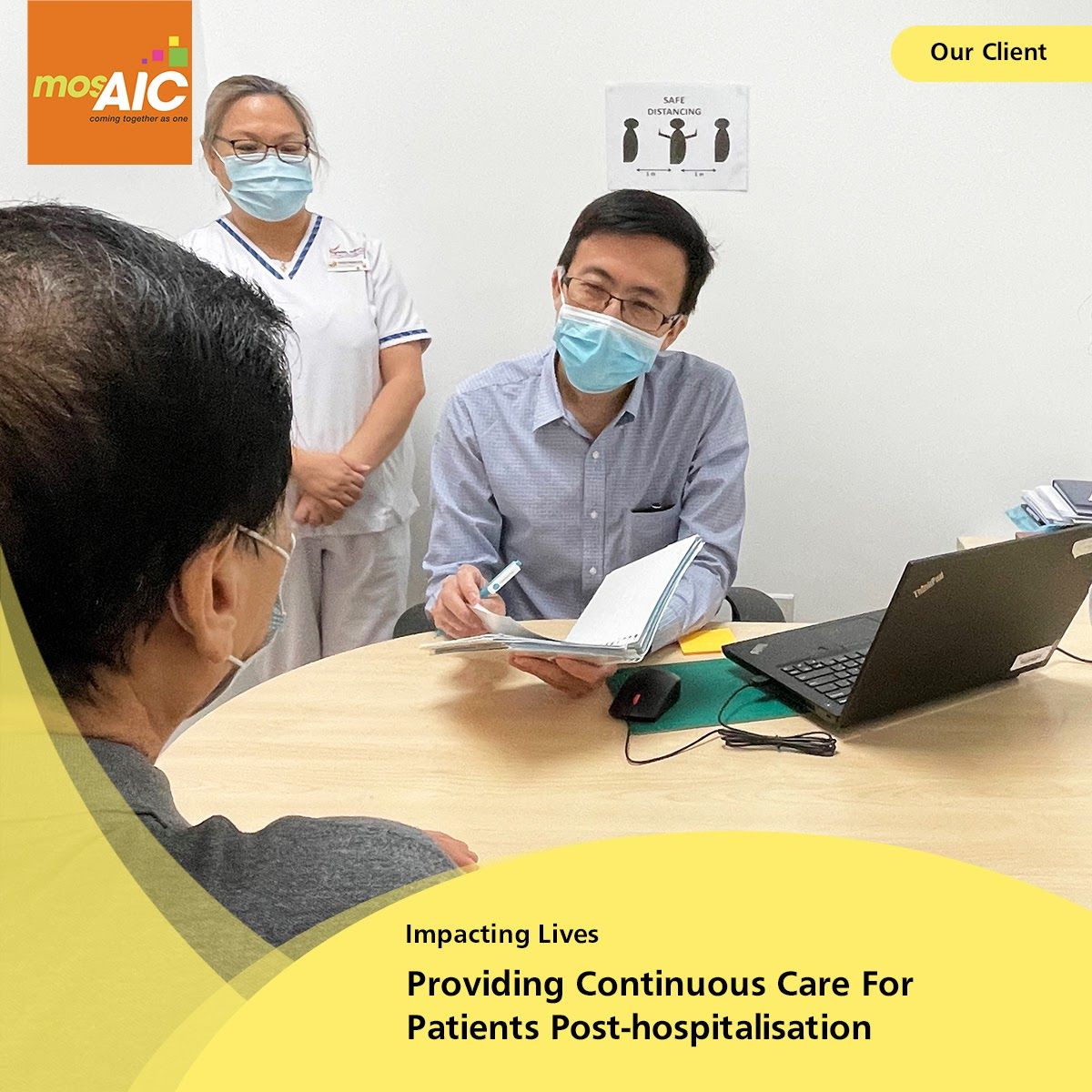BVH’s iPCARE Programme Provides Continuous Care for Patients Post-hospitalisation

When one faces a health crisis, the changes to your lifestyle can often be overwhelming to bear. Patients and their caregivers may suddenly find themselves having to juggle different responsibilities throughout their healthcare journey, even after discharge from the hospital – from managing their medications to numerous doctor appointments. The stress of time and resource management for these patients and caregivers can take a toll on the patient’s recovery or general well-being.
Bridging the disconnect between primary care and Community Care providers
Caring for someone with complex morbidities and psychosocial needs can be very stressful. The care team at Bright Vision Hospital (BVH) recognised that a shared care model between primary care and community care providers can help alleviate that stress, and set out to bridge the gap.
Recovering patients typically need to make frequent visits to the hospital for follow-up appointments after discharge, and the BVH team realised that patients who are not well-supported in the community or at home after discharge are at a higher risk of deterioration. Having proper support channels is vital for a patient’s successful recovery, and this is how the BVH team came up with the Integrated Primary Care for At-Risk Elderly (iPCARE) programme to help mitigate the challenges faced by both seniors and their caregivers.
Extending care from BVH to GPs
As Singapore’s first public community hospital since 2011, BVH provides a comprehensive range of inpatient services for sub-acute, rehabilitation, palliative and chronic sick patients. The doctors in BVH are generalists trained in Family Medicine, bringing with them a wealth of experience in providing patients with follow-up care and other complex care needs.
Through the iPCARE programme, the BVH team partners up with an extensive network of GPs, Polyclinics and Community Care providers to ensure patients receive coordinated care for allied health and social care services in the community.
How the iPCARE programme works
The iPCARE programme was piloted in BVH in 2017. As part of the programme, the BVH team will assign a Case Manager (Registered Nurse) who would guide and coach patients on how to take care of themselves well after their hospital discharge. The BVH team will also “match” patients to GPs of their choice and support partnering GPs with the necessary resources.
Together, the BVH’s multidisciplinary team and the GP will review and develop a personalised care plan for the patient, which includes:
- Following up with patients and teaching them how to monitor their condition at home
- Helping patients to understand medication purposes and deconflict multiple medications
- Making a patient’s home environment safer
- Recommending devices that will aid patient’s mobility or in their respiratory care
The benefits of the programme include:
- Management of chronic conditions and prevention of health complications
- Understanding of patient’s medication from GPs
- Minimising patients’ healthcare expenses by preventing unnecessary hospitalisation and visits to hospital outpatient clinics
- Having quick access for caregivers to better care and support patients
Before the iPCARE programme, the BVH team found many seniors defaulting on their follow-up care due to the absence of proper case management. Now, seniors who require frequent hospital admissions can now receive seamless care and support, improving outcomes.
Instead of having to go to the Specialist Outpatient Clinics or Accidents & Emergency (A&E) at hospitals, seniors can now receive the care they need from neighbourhood GPs supported by the BVH team. This integrated care programme saves time and money for the patients and allows greater efficiency for our healthcare system.
A connected care system works
The iPCARE pilot programme has been supported by the Tote Board Community Health Fund (TBCHF), which supports social service agencies and non-profit organisations in running innovative programmes for the Community Care sector.
“This enhancement of the Primary Care Network of GPs supported by BVH nurses and care coordinators has helped to alleviate resources required at hospitals and, more importantly, empowered seniors to age in place.”
- Faith Aw Yong. Assistant Director of Development & Partnerships (Social) at Tote Board
As of March 2020, the iPCARE programme saw the participation of over 600 patients. While it was initially targeted to integrate the support of 20 GP partners, a total of 62 GP partners have came on board. In the same period, the BVH team has successfully handed over 110 patients to primary care.
By engaging the support of GPs in the community, seniors with chronic illnesses and complex needs can receive help without having to make regular visits to the emergency department or be admitted to the hospital. Through this programme, the BVH team can also have peace of mind that their patients will get the necessary follow-up care after they leave the hospital.
Plans have also been put in place to expand on this successful care model, and open iPCARE clinics in Sengkang Community Hospital and Outram Community Hospital.
“Many patients (with complex needs), their caregivers and healthcare team wonder if these patients can cope well in the community after optimising their function in the community hospital. Through iPCARE, they have renewed confidence in achieving this through high quality primary care provided by our dedicated GP partners and comprehensive backend support from the community hospital.”
- Dr Andrew Wong, Associate Consultant of SingHealth Community Hospitals
Images are courtesy of Bright Vision Hospital, and are taken before the Covid-19 pandemic.
More from mosAIC:
Career Diaries: I'm a Healthcare Attendant and This is What I Do
Facetime with Clarity Singapore’s Executive Director, Joachim Toh
Everything a Community Care Organisation Needs to Know About PDPA
